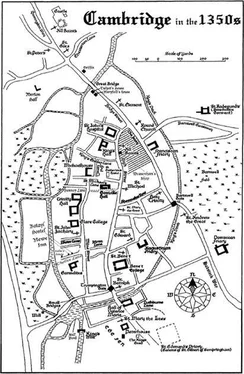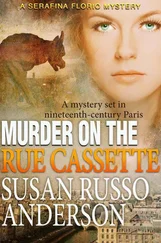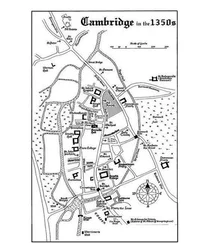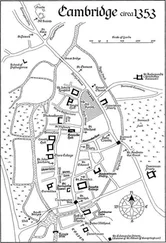Bonabes’s hands were shaking as he took a taper and lowered the dancing flame to the ribauldequin. Beside him, he heard Gyseburne take a deep breath and hold it.
At first, nothing happened. Then there was a bright flash and a resounding boom. The general saw Gyseburne and Bonabes flung backwards like bundles of rags, and when the smoke cleared, the weapon was nothing but a mess of smoking, twisted barrels. The general approached cautiously, stepping carefully over the places where the grass burned. One of his men tried to stamp the flames out, but something sticky adhered to his boot, and then that too was blazing.
Incredibly, Bonabes was still alive – he had taken the precaution of wearing armour, which had protected him to a certain extent. Gyseburne had been killed instantly.
‘The recipe for wildfire,’ the general said urgently. ‘Where is it?’
It was clear that Bonabes did not understand what had happened. His hand moved weakly towards a sheaf of parchments. The general made a grab for them, but they were spotted with wildfire, and he jerked away. Aghast, he watched flames consume them, teasing him with a tantalising glimpse of diagrams and formulae.
‘Tell me,’ he ordered urgently, grabbing Bonabes by the front of his tunic. ‘Quickly, before it is too late.’
But there was wildfire on Bonabes’s clothes, and he was far too dangerous to hold. The general let him drop back to the ground, assuming from the dazed expression in Bonabes’s eyes that the explosion had knocked him out of his wits. Disgusted, he walked back the way he had come, ignoring the screaming plight of the soldier who had been foolish enough to step on the wildfire. Perhaps it was just as well the secret was lost, he thought. Such weapons were hardly ethical.
Another shadow emerged from the trees when he had gone. She smiled her satisfaction: the dabs of molten lead she had put in the ribauldequin’s barrels had taken care of all her problems. The weapon was unrecognisable, and would rust into the ground eventually, while the formula for wildfire was safe from the French.
Bonabes was able to turn his head and look at her.
‘You followed me!’ he said softly, shocked but not surprised.
‘All the way from Cambridge,’ replied Dame Pelagia. ‘I admire your tenacity and courage, but I could not let you hand such a weapon to your masters. And there was Ayera to avenge.’
‘But you have not won everything,’ said Bonabes, forcing a note of triumph into his feeble voice. ‘You do not have the secret, either.’
‘No?’ asked Dame Pelagia softly, removing a scrap of parchment from her sleeve.
Although Oxford had a University library in the 1300s, Cambridge does not seem to have had one until the following century. There are references to an earlier central collection of books, perhaps stored in chests in Great St Mary’s (the University Church), or in one of the convents, but there appears to have been no specific building. The first purpose-built library (raised in the 1400s) was located in the complex still called the Old Schools, and there it remained until the twentieth century, when plans were laid to move it west of the river. In May 1934, the first books were carried to a new building designed by Sir Giles Gilbert Scott, which is still in use today.
The University Library is one of Britain’s copyright libraries, and a magnificent resource for research and learning. Its atmospheric jumble of tightly packed shelves, spacious reading rooms and echoing staircases are remembered affectionately by generations of students and Fellows, and as it is constantly expanding, will continue to be for generations to come.
Many people in Murder by the Book were real. The Dunning family was a powerful clan in Cambridge in the thirteenth and fourteenth centuries, and several members were mayors and burgesses. They owned a pretty stone-built house, later named Merton Hall, which has survived the ages, and still forms part of St John’s College. The Tulyet family, including several Richards, was another town family of note, as were the Frevills.
The office of University Stationer was an important one, because this was the man charged with producing exemplars for students to hire. John de Weasenham held the office in 1361. He was born in 1328, and records show he was married. He would have hired scribes to produce his exemplars; they were known as exemplarii .
A scribe named Willelmus de Hildersham murdered one John Ayce of Girton in Cambridge on 7 February 1334; Ayce’s father was named Robert. Hildersham was arrested, but pleaded benefit of clergy, and was released into the care of the Church after the secular jury had found him guilty.
The head of the Carmelite Priory in the mid-fourteenth century was William Etone. He held the post until about 1381. Thomas de Riborowe and John Jorz were two of his friars.
In terms of the medical men, John Gyseburne was a Cambridge physician in the mid-fourteenth century, and John Meryfeld later went to work in St Bartholomew’s Priory in London. William Holm was a royal surgeon in 1361; records show him being awarded a fur-lined robe for his services to Princess Isabella. William Rougham was one of Gonville Hall’s foundation Fellows, and became its Master in 1360. He paid for the completion of the College chapel.
Michaelhouse’s Master in 1357 was Ralph de Langelee, and College Fellows included Michael de Causton, William de Gotham, Thomas Suttone, John Clippesby, William Thelnetham, Thomas Ayera and John Valence. Michaelhouse, along with neighbouring King’s Hall and several hostels, became Trinity College in 1546. Michaelhouse’s name survives in St Michael’s Church, which has been lovingly restored, and is now a community centre, art gallery and a popular coffee shop called Michaelhouse.
Other real characters include John Rolee, who was associated with Corpus Christi College (often called Bene’t) in 1357; Robert de Sawtre, a Fellow of Peterhouse from 1339 until his death in 1352; Philip and John de London, who were King’s School scholars in 1319 and 1327 respectively; and Thomas Northwood, who died in 1354. William Walkelate was admitted to King’s Hall in about 1350; he was the son of another William Walkelate, who was the King’s sergeant-at-arms, and he was ‘removed’ from the College in 1358. William de Tynkell was Chancellor of the University in the 1350s, and died in 1370.
The Battle of Poitiers in 1356 was a significant event in French history. Many noble families lost heirs in the slaughter, and the defeat rocked the nation’s confidence and pride. A large number of prisoners were taken, most of whom negotiated ransoms within a few days, although others, like King Jean, the Archbishop of Sens, the Count of Eu and Bonabes IV de Rougé de Derval were taken to England first. Bonabes was kept in the Tower of London until his ransom (£1886) could be paid. The money was handed over, although he managed to escape from the Tower in the interim.
The ransoms were crippling to a country in economic and political turmoil, which was probably exactly what Edward III intended. The burden of providing the money fell on the peasantry, who resented it deeply: the nobles had failed to keep their end of the bargain by protecting them from invasion, so why should they buy their overlords’ release? It was one of the factors leading to the Jacquerie Revolt in the summer of 1358 – a popular uprising that was quelled with vicious brutality by the nobles.
By the time Poitiers was fought, rudimentary artillery had been in use for several years. One such device was the ribauldequin. It was capable of discharging several missiles simultaneously, and for this reason it has (probably erroneously) been hailed as the precursor of the modern machine gun. It was not noted for its accuracy, and was often more dangerous to the men operating it than to the enemy. Its power was probably psychological, along with the fact that its noise and smoke frightened warhorses.
Читать дальше












